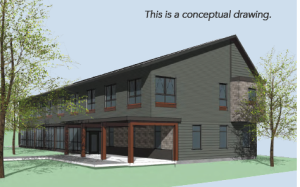
This has been a most challenging year for Groundworks, for the people we serve, and for the greater Brattleboro community. The staff and Board at Groundworks are committed to resiliency and to building and maintaining caring relationships—understanding that we all must do our part to build a stronger community.
“Our part” at Groundworks is primarily to support people who are experiencing homelessness and/or food insecurity, to provide temporary shelter, and to assist individuals as they transition to more independent and sustainable housing. With this in mind, we have begun planning for a new shelter at 81 Royal Road. We and our predecessor agency (Morningside House) operated a shelter at that location from 1979 until April 3, 2023, when our friend and colleague Leah Rosin-Pritchard died tragically at the site and we closed the program. We needed some time to begin healing and to rethink the Morningside program in the broader context of significant changes—both to increase safety and to improve programming—that we have been implementing across all of Groundworks services.
For the past several months, we have put a great deal of thought into the building and the programmatic changes that we expect will be notable improvements for shelter residents, Groundworks’ staff, and our neighborhood. We have consulted with Morningside Commons residents and with housing and social service officials both locally and statewide. We are eager to announce these plans to the broader Brattleboro area community.
To create the program we envision at Morningside, we intend to raze the existing buildings on the site and build a new, thoughtfully designed structure. Renovating the existing farmhouse at 81 Royal Road would be very expensive and would result in fewer people being served than the 30-bed program that we previously operated there.
The architect we are working with specializes in designing shelters. They designed our shelter on South Main Street. What we learned through that process is that designing a space for a program—versus “doing the best you can” with a pre-existing space like the Morningside farmhouse or the church basement and dormitory that preceded our shelter on South Main Street—makes an incredible difference in functionality, safety, and program success.
With a well-designed new building, we can offer 40 beds and versatile program space with carefully placed sightlines. Coupled with 24-hour, 7-day-a-week staffing, these changes will allow us to more adequately monitor the comings and goings of shelter guests, more effectively support those guests programmatically, and provide a safer shelter experience for everyone.
At Groundworks, we develop relationships with the people we serve. This helps us understand people’s immediate and long-term needs, including any mental health and/or substance use challenges they may or may not have, and what type of housing may work best for each person. Our intake process includes questions that identify connections to other services, as well as obtaining permission to coordinate with other service providers. We ask if people have health insurance, a primary care provider, identification documents, and whether they have ever been accused of a violent crime, among other things. The questionnaire gives our staff a baseline understanding of needs, risks, and potential challenges for each person we serve so that we can wrap the appropriate levels of service and support around each individual. It also helps us determine if a person’s needs are greater than we can accommodate in Groundworks programming.
Based on this information and the relationship we develop with each program participant, we will use the Groundworks Drop-In Center on South Main Street as the conduit to accessing shelter at Morningside. Given the current historically low housing vacancy rates and the various other systemic failures that are increasing the numbers of unhoused people in Brattleboro and beyond, we expect that, initially, stays at the new shelter at Morningside will be longer than what would be ideal for shelter residents or for the homelessness services system. But our hope and intention is that the new shelter will become a place where residents stay for only a few months while building skills and connecting to sustainable, permanent housing.
It is springtime. A time of renewal and hope. We’re feeling that at Groundworks and we are grateful to be continuing to collaborate with our many amazing community partners as we meet basic needs with dignity and work to continuously strengthen our community.
